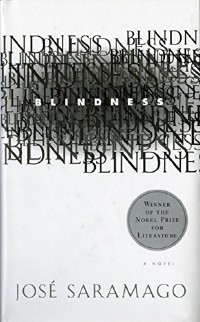
José Saramago refuses to use quotation marks, question marks and exclamation marks in his writing.
José Saramago mostly rejects the idea that paragraphs are a writing tool that exist and can be used to make a text more readable.
José Saramago mostly refuses to name his characters and chooses to refer to them instead by their job, title or some aspect of their appearance (eg. The “doctor’s wife”, the “girl with the dark glasses”).
Why does José Saramago do this?
I don’t know. All I know is that it makes reading his work harder than it needs to be.
If you’re able to get past the way he writes, or perhaps even enjoy it if you’re some kind of sicko, then you’ll usually find an interesting story lying underneath with twists and turns that keep you emotionally invested in the world he’s built.
Blindness is by far his most popular work and it’s easy to see why. We follow a doctor and his wife during a pandemic of blindness as they, and others affected by the pandemic, are forced into a mental asylum repurposed to contain the newly blind.
The doctor’s wife isn’t really blind though (she seems to be immune to this new affliction). Lucky for us because the story is mostly told from her perspective.
Through her eyes we watch as the asylum fills up with the blind and we watch as they all struggle to perform the most simple of tasks rendered complex due to their lack of sight and their inexperience with this disability.
Tensions run high and conflict ensues as the last spark of hope is lost and gradually replaced with desperation and hunger for food and for control over their uncertain future.
Blindness (the affliction and the novel) is terrifying. Our eyesight is something we rely on more than any other sense to navigate and interact with the world around us.
The prospect of losing it is appropriately terrifying. Blindness (the novel) turns this fear into a reality we can perceive and forces us to imagine how horrifying it would be for you and everyone you know to lose their eyesight, and the chaos that would follow.
Even with a very surface level reading of the novel, Blindness offers a compelling narrative with meaningful stakes and mostly believable world building that sinks its teeth into you and doesn’t let go until the very end.
I say mostly believable because for the most part everything that happens makes sense but I find it very hard to believe that the doctor’s wife, the only person who can see in the asylum, couldn’t have prevented the horrific series of gang grapes from happening a little earlier.
Always remember to put on your suspension of disbelief pants on before reading and you’ll be just fine.
If you’re looking to read Blindness at a deeper level to unpack what José Saramago is trying to say about the world we live in, you can do that too.
The blindness could be an allegory for the blind faith some people put in “God” (Saramago is an atheist and religion plays a role in Blindness so this isn’t much of a stretch) or the socio-economic systems that rule our world, “capitalism”, or any sort of magical thinking that makes us feel better about our lives and the world we live in.
We delude ourselves into thinking about the world in a way that makes us comfortable. But this prevents us from seeing the world around us as it is and prevents us from being at peace with reality as it is instead of reality as we perceive it to be.
I’m no literary critic so take all this with a grain of salt. Whatever you’re looking for in a novel, you’re likely to find something to latch onto and keep you hooked reading through Blindness as long as you’re able to get past José Saramago’s obtuse writing style.
I’m excited to dive deeper into the rest of José Saramago’s work having read through two of novels and enjoying both of them (All The Names and Blindness).
If you’ve got any recommendations for me, send them my way! Thanks.